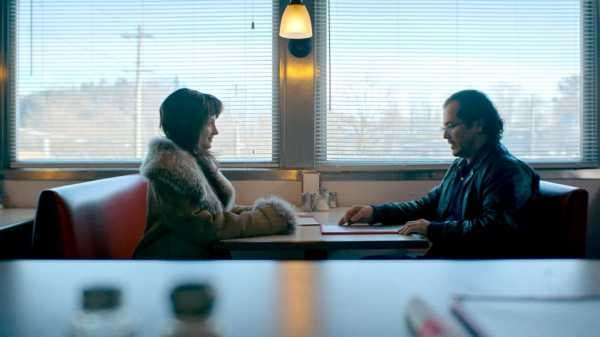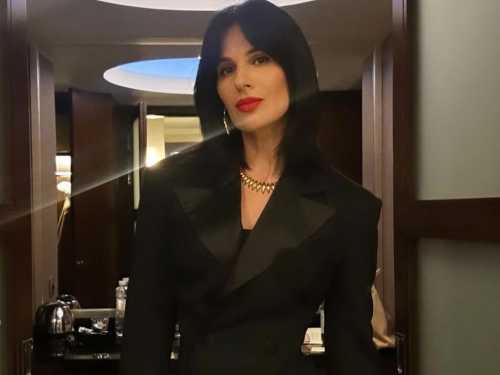
“Nancy,” the writer and director Christina Choe’s first feature, is noteworthy and well worth seeing, both for its enduring effect and for its untapped possibilities. It’s the story of a cruel hoax undertaken in a state of desperate need. Andrea Riseborough plays Nancy Freeman, a thirtysomething woman living somewhere in New England, in a house with her ailing mother, Betty (Ann Dowd), who has Parkinson’s Disease and requires Nancy’s frequent care. Nancy is a writer whose story submissions get only rejections; she works as a temp at a local dentist’s office, where she tells her coworkers that she has vacationed in North Korea (with photos to back her up); and her scant social life is centered on her pseudonymous blog, in which she falsely claims to be the bereaved mother of a child who died. Betty dies suddenly; days later, Nancy watches TV and sees a report about a couple, Leo and Ellen Lynch (J. Smith-Cameron and Steve Buscemi) whose daughter, Brooke, was kidnapped thirty years ago, when she was five years old, and was never seen again. The report includes an age-progression image of how Brooke might look now. Nancy, noting her own vague resemblance to the face in the image, calls the family, claiming to suspect that she’s Brooke; she’s invited to the home of the Lynches, who give her an instant, if tentative, sense of belonging, welcoming her warmly, even lovingly, while nonetheless investigating her claim.
The reverberations from the contours of this complex, intense story are mighty, intertwining the power of creating fictions with the lure of living them, the failures of family life with the urgent desire for belonging, the frustration of a marginal existence and the yearning for a place in the world, the connection of identity and memory. The story is haunting not because of any hint of the supernatural or the ghostly but because of its connection to the unconscious, to the notion of the uncanny—the alienation of the familiar. Its energy arises in daily details that Nancy’s increasingly bold and risky impersonations render strange and elusive.
Yet, in composing the story, Choe stints on its details. For instance, Nancy is a writer, but the movie doesn’t divulge her writing. Likewise, Nancy’s cultural life doesn’t exist; her interests seem not to extend beyond her somewhat elaborate hoaxes. When Nancy simulates pregnancy for a meeting with a man (John Leguizamo) whom she has met through her blog, she happens to have a prosthetic prop on hand, but the movie never says why she has it. When Nancy calls the Lynches and claims to be Brooke, Ellen asks her to text over a recent photo of herself; the movie never shows that image, which would be deeply resonant for both women—it would be Nancy’s crucial item of self-presentation and would also stoke Ellen’s anticipation of her arrival and set up a comparison point for the upcoming reality of their meeting.
Then, when Nancy meets Ellen and Leo, the movie, instead of rising into psychologically exotic realms, remains tethered to plot points and false leads that their encounters merely nail down. Nancy arrives with her cat, Paul—and not only is Leo allergic to cats but Brooke disappeared when she let go of Ellen’s hand to dash to a pet store to look at a kitten she wanted. Ellen is a professor of comparative literature, and, when Nancy sees a book by Shirley Jackson on Ellen’s desk and declares that Jackson is her favorite writer, Ellen admits that Jackson was the subject of her dissertation. (When Nancy says that she, too, is a writer, Ellen grasps at the connection as a sign of a family resemblance.)Nancy’s discussion of the life she’s led since the age of five is terse, plain, undetailed—but then so is Ellen’s and Leo’s conversation. When Nancy goes out to the nearby woods, Ellen tells her to wear proper colors, because it’s hunting season; with that line, a virtual gun is introduced into the story, and it will inevitably go off in the last act.
The movie’s narrowly dramatic technique, with its curtly informational scenes, is matched by the emotional overdetermination of the images. The dour mood is forced and reinforced by dim and watery lighting and looming close-ups of Nancy (who’s often in the frame alone, heavy-handedly emphasizing her sense of isolation). Several of those close-ups are potent—notably, one, earlier on, in which she holds a half-folded printout of Brooke’s face (as realized by police in an age-progression simulation) beside her own and creates a reverberant fusion as she looks in the mirror. It’s a moment that strikes sharply—and that Choe milks with a slow zoom until its resonance dies out before it leaves the screen.
On the other hand, by reducing the characters’ traits to ostensible essentials and lending them as few particulars as possible, she renders them blanks to be filled in not by the movie’s action but by the actors themselves. The result is an empathetic sleight of hand, in which the viewer’s interest surreptitiously shifts from characters to performers, because the performers—and, certainly, these performers—reflect, even in repose, complex inner lives that are far more vital than the world that’s depicted. Thus the celebration of the art of the actor takes the place of character development.
It’s a shift that’s emblematic of the moment, exemplary of the sophisticated, art-house manner endemic to festival favorites, and it’s similarly reflected in other elements of the style of “Nancy.” Its fragmentation and its opacity, marks of cinematic modernism, are normalized—short scenes don’t compress moments of heightened expression but merely dispense doses of information, moments of quiet opacity merely provoke a mood of pensive foreboding, ambiguities oscillate between limited dramatic options. The impacted passions and disturbing aftershocks of Choe’s story—even though distilled to familiar tropes—nonetheless place “Nancy” far ahead of most acclaimed movies in theatres now.
Sourse: newyorker.com






